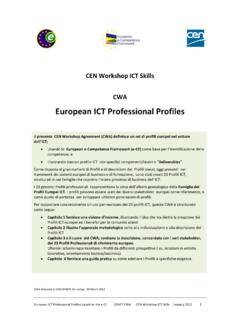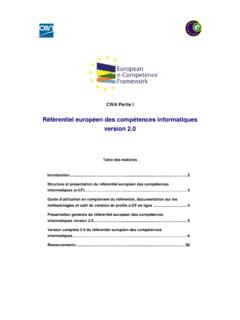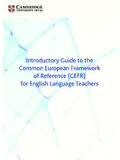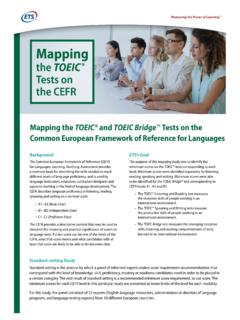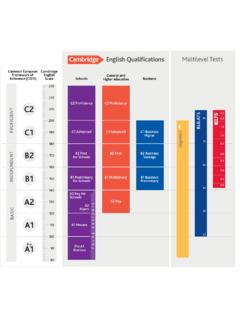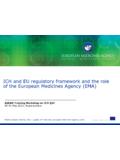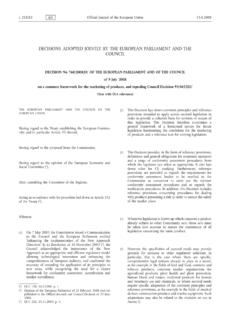Transcription of European e-Competence Framework
1 A shared European Framework for ICT Professionals in all industry sectorsA common European Framework for ICT Professionals in all industry e- competence FrameworkForeword This CWA document publishes the European e- competence Framework (e-CF) version ; the result of 8 years continuing effort and commitment by multi-stakeholders from the European ICT very first practical steps towards the e-CF were initiated in 2006 by Airbus, BITKOM, CIGREF, e-Skills UK, Fondazione Politecnico di Milano, IG Metall and Michelin, with the encouragement of the European Commission and strongly backed by the CEN ICT Skills Workshop community.
2 From multiple market perspectives, roles and expertise, representatives of many organisations and also individuals have subsequently contributed to the e-CF initiative. They have collectively contributed to the development of the e-CF from their varied perspectives bringing technical expertise, political awareness or constructive feedback. The CEN ICT Skills Workshop wishes to recognize and acknowledge these multiple contributions from the following non-exhaustive list of organisations.(ISC) A / I / M bvAFPAAICAAIP-ITCSAIRBUSASIIN Pasc@lineAssociazione Informatici Professionisti Italiano computer societyATI Banca d ItaliaBayer Business ServicesBCS Koolitus ASBIBB - Bundesinstitut f r Berufsbildung.
3 Birkbeck University of LondonBITKOMB reyer PublicoBritish Computer SocietyCapgemini Capgemini AcademyCEDEFOPCEPISCIGREFCIONET CISCO Cisco SystemsClock IT SkillsCompTIA Germany GmbHConsultancy for Informatics and Education Hacquebard bvConsulthinkCorporate IT ForumCPI Competenze per l InnovazioneCyprus Computer SocietyDassault Syst mesDEKRA Akademie GmbHDeutsche Telekom AGDiaz Research LimitedDND Norwegian computer societyDutch Ministry of Economic AffairsECABOECDL FoundationEDF Electricit de FranceEeSA European e-Skills Associatione-Jobs ObservatoryEMEA empirica GmbHEMSI GrenobleESI BGe-Skills ILB e-Skills UKEstonian Qualifications Authority KutsekodaEstonian Association of ICTEURO CIOE urodisneyEuropean Metal-workers FederationEuropean Software Institute CEEEXINF ondazione Politecnico di Milano Foundation IT Leader Club PolandFundaci n InleaFZIHBO-I FoundationHEINEKEN InternationalHominem Challenge IBM UKICT Human CapitalIG MetallInnovation Value InstituteInnowareInstitut PIIntel JapanIrish Computer SocietyIT Akademie BayernIT StarItalian Computer SocietyITcert
4 SolutionsitSECURITY*itTRACK*IWA ItalyKPNKWB eVLGMALPIM apfreMichelinMicrosoft MinEZMinist re de l ducation et de la recherche FRMinistry of Economic Affairs, The NetherlandsMPSAMS Consulting & Research PMEN orwegian computer associationORACLEPIN SME PMIP le EmploiPROSA - Association of IT ProfessionalsPSA Peugeot CitroenPvIB (Dutch platform for information security professionals)SAPS killsnetSyntec InformatiqueTHAMES CommunicationThe Corporate IT Forum / national body of EuroCIOT rinity College DublinUK Cabinet OfficeUNESCOUni DuisburgUNI Europa UNINFOU niversit de Bretagne OccidentaleUniversity Danube / CEPAU niversity Gent / Fac.
5 EC&BAUniversity La SapienzaEuropean e- competence Framework common European Framework for ICT Professionals in all industry sectors. CWA 16234:2014 Part 1. CEN2A common European Framework for ICT Professionals in all industry sectorsThe European e- competence Framework (e-CF) version provides a reference of 40 competences as required and applied at the Information and Communication Technology (ICT) workplace, using a common language for competences, skills and capability levels that can be understood across Europe. As the first sector-specific implementation of the European Qualifications Framework (EQF), the e-CF was created for application by ICT service, user and supply companies, for managers and human resource (HR) departments, for education institutions and training bodies including higher education, for market watchers and policy makers, and other organisations in public and private sectors.
6 Further complementary materials available: User guide for the application of the European e- competence Framework (e-CF) version (CWA Part 2) Building the e-CF a combination of sound methodology and expert contribution. Methodology documentation (CWA Part 3) 15 case studies illustrating e-CF practical use from multiple ICT sector perspectives (CWA Part 4) A multilingual e-CF profiling tool enables easy navigating through the European e- competence Framework and related European ICT Professional Profiles together with customized profile construction and content export.
7 E- competence e- competence Framework common European Framework for ICT Professionals in all industry sectors. CWA 16234:2014 Part 1. CENT able of contentsAnnex 1: Abbreviations used within the e-CF 4 European e- competence Framework (e-CF) Founding Principles 5 Introduction to the e-CF version 7e-CF development history 7 From e-CF version to version updating highlights 8e-CF supporting material 9 Political context and support 9e-CF structure and look 10 European e- competence Framework overview 11 European e- competence Framework full version 12 Annex 2: European e-CF and EQF level table 51 Annex 1.
8 Abbreviations used within the e-CFCMMI capability maturity model integrationCOBIT control objectives for information and related technologyCPD continuing professional developmentCSR corporate social responsibilityDBMS database management systemsDSS data storage severIaaS infrastructure as a serviceICT information and telecommunication technologyIDE integrated development environmentIDL interface definition languagesIPR intellectual property rightsIS information systems [in the broad understanding of including software, hardware, data, people, procedures and business processes] see: , especially the Overview ISO international standardisation organisationITIL Information technology infrastructure libraryKPI key performance indicatorsPaaS platform as a ServiceRAD rapid application developmentSaaS software as a ServiceSLA service level agreementSWOT strengths, weaknesses, opportunities and threats [analysis]VAR value-added resellersEuropean e- competence Framework common European Framework for ICT Professionals in all industry sectors.
9 CWA 16234:2014 Part 1. CEN4 European e- competence e- competence Framework common European Framework for ICT Professionals in all industry sectors. CWA 16234:2014 Part 1. CEN5 European e- competence Framework (e-CF) Founding principlesThe European e- competence Framework (e-CF) was established as a tool to support mutual understanding and provide transparency of language through the articulation of competences required and deployed by ICT professionals (including both practitioners and managers). To support Framework users and guide developers of e-CF applications, the following narrative provides an overview of the underpinning philosophy and principles adopted during e-CF construction and successive updates.
10 The Guiding Principles The e-CF is an enabler; it is designed to be a tool to empower users, not to restrict them. The e-CF provides a structure and content for application by many types of users from organisations in the private and public sector, ICT user or ICT supply companies, educational institutions including higher education and private certification providers, social partners and individuals. In this broad application context, the e-CF is designed to support common understanding, not to mandate the use of each and every word used within the e-CF.


